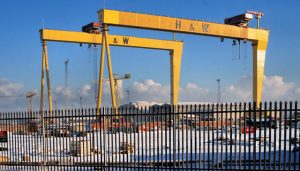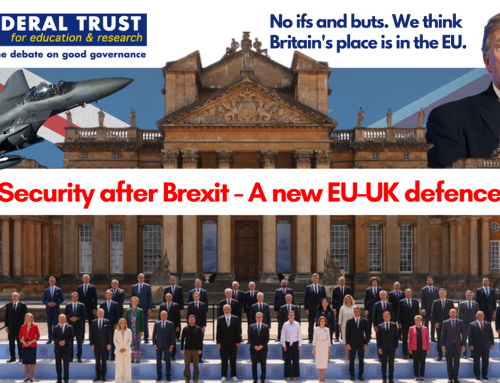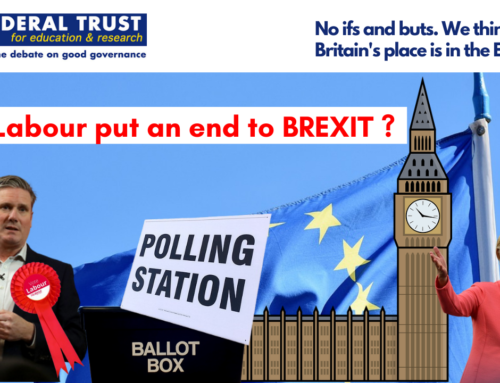
Photo credit: Albert Bridge (Wikimedia Commons/ CC BY-SA 2.0)
The Brexit project entails much collateral damage. The most prominent potential victim of UK departure from the EU to date – though others will no doubt become increasingly difficult to ignore – has been the island of Ireland. Much attention at UK level has understandably been devoted to the threats posed to the peace and security aspects of this problem. That the Republic of Ireland and the UK would both remain indefinitely within the EU was an underpinning assumption of the peace process, including the 1998 Belfast/ ‘Good Friday’ Agreement. Brexit inevitably creates challenges for this arrangement. The only meaningful questions that arise involve how bad they will be, and the precise form they will take. A related but distinct aspect to the negative impact of Brexit upon the island of Ireland and within it Northern Ireland involves its economic dimension.
In the period following the reaching of the new exit agreement, and the Northern Ireland protocol it contained, both the EU and UK presented it as providing Northern Ireland with the ‘best of both worlds’. This formulation sought to convey the idea that Northern Ireland would remain able to trade with the Republic and the EU as a whole; retain beneficial connections to the UK economy; and also have access to any trade agreements the UK might reach after leaving the EU. According to this optimistic standpoint, moreover, if the arrangement proved unsatisfactory, the Northern Ireland Executive had the option of pulling out of aspects of it. It was certainly convenient to those who had arrived at this agreement to depict it in this light. But a less charitable interpretation of such a claim was that a deal that appears too good to be true seems that way because it is. Having cake and eating it was a declared intention of the UK Prime Minister who secured and successfully ratified this agreement. It has become increasingly apparent that, for the UK as a whole, departure brings with it serious costs – that are, moreover, more immediate and tangible than any benefits that might accrue. It may be that a similar unravelling of hopes for the specific position of Northern Ireland is due to take place.
From an economic standpoint, much rests for Northern Ireland on the protocol being made to work – if indeed it is possible for it to do so. There are clear reasons why there might be concerns in this area – for the UK, the Republic of Ireland, and the EU as well as Northern Ireland itself.[1] Brexit risks disrupting trade in multiple ways. It could affect patterns between Northern Ireland and the Republic of Ireland; Northern Ireland and the EU; and Northern Ireland and Great Britain (though the latter is not technically international trade). Northern Ireland is dependent on a three-way relationship that is now in jeopardy. In 2018, total sales of goods and services to the Republic accounted for £4.2 billion (up from 3.8 in 2017); to the rest of the EU £2.5 billion (up from 2.0); and to Great Britain £10.6 billion (down from 11.6). Sales to the rest of the world were £4.5 billion in total (broadly static from the previous year). Therefore, while sales to Great Britain account for clearly the largest amount, they declined last year; and sales to the EU as a whole (the Republic and the rest), at £6.7 billion, clearly exceed those to the rest of the world combined.
The appearance of a trade barrier within the island of Ireland would be likely to have some very specific problematic economic impacts in Northern Ireland: on smaller enterprises and the agricultural sector. Food and live animals account for about a third of sales in goods to the Republic; while in 2018, 93 per cent of small and micro businesses in Northern Ireland (that is with less than 50 employees) accounted for 46 per cent of exports in goods and services to the Republic. A hard border would create serious practical difficulties. Cross border sales often involve ‘intermediate goods’, that is goods that are not the final product, but are themselves used in production. Over a hundred million border crossings take place every year, with a minimum of 30,000 commuters travelling each way; if they were hampered, businesses would surely suffer.
Brexit will be disruptive to trade and by extension production and employment for the whole of the UK. The sharper the divergence in terms of regulations and tariffs, the greater the dislocation will be. Unless it is successfully insulated from these effects (if it can be) the impact on Northern Ireland (and by extension the Republic) will be pronounced, because of the enmeshed economy of the island of Ireland. The insertion of barriers dividing this single market would compromise it seriously; as would a separation from the UK or the EU as a whole. What, then, are the principal sources of doubt about the likelihood of this agreement being able to provide the benefits of the EU and the UK at the same time?
First, the UK government has at times created the impression that it might be willing to renege upon the Northern Ireland aspects of the withdrawal agreement if it does not secure a Free Trade Agreement from the EU that it regards as satisfactory, or if it thinks it will fail to do so. In such a scenario non-compliance could be for the UK a source of leverage. It might be employed in advance of the deadline at the end of 2020 when the transitional arrangements (assuming they are not extended) come to an end, to force concessions. Or it could be used in circumstances after the cessation of transitional arrangements. At this point, the EU might be faced with the unpalatable choice between introducing customs controls on the island of Ireland, or allowing its Single Market and Customs Union to be compromised. None of these outcomes would be beneficial to the economic environment in Northern Ireland; and any period during which they seemed possible would surely bring about immense disruption and uncertainty. Lately, the UK government has created a sense that it is willing to abide by the agreement – or at least its version of what the agreement means. Nonetheless, it cannot fully be excluded that it will opt for non-compliance at some future juncture. Another possibly is that the UK will be so slow in ensuring it is able to implement the agreement that by the end of the year it will simply not be ready to fulfil it in practice.
The government has – since May this year – indicated that it accepts the basic principles of the Northern Ireland aspects of the exit agreement – namely that customs and certain regulatory rules originating in the EU apply to Northern Ireland; that there will be an internal trade barrier between Great Britain and Northern Ireland; and that the UK is responsible for enforcement of these arrangements. Yet – a second problem – even in acknowledging this position, it did so in a way that seemingly sought to alter the meaning of the agreement in ways that maximised flexibility for it; that suggested that its compliance might be less than rigorous; and in ways that presented the arrangements as fleeting rather than lasting. But if the agreement has any chance of working at all, it will only do so if the UK upholds its end of the bargain fully. If – for instance – there is unauthorised leakage of exports into the European Customs Union from Great Britain via Northern Ireland, the EU will be obliged to take action that could end in a curtailment of the functioning of the agreement.
The possibility that the UK might act in – from an EU perspective – bad faith, either seeking to abandon the agreement or failing properly to implement it – leads to a third potential area of difficulty. The smooth operation of the protocol in a way that minimises administrative burden and hindrances to trade requires trust. The EU must believe that the UK is committed to fulfilling the agreement. The track record of the current UK political leadership might not inspire such a sentiment, and could encourage the EU to take a more punctilious and assertive approach to implementation that will in turn impose greater burdens on business.
Fourth, the principle of consent inserted into the protocol could be a source of uncertainty and instability impacting negatively on business. The Northern Ireland Assembly can vote either every four or eight years on whether it wishes to withdraw from some of the key aspects of the withdrawal agreement. On the surface, this arrangement might seem sound from the point of view of democracy and self-determination. Northern Ireland will have a chance, so the argument runs, to assess how the agreement has worked in practice, with the possibility of withdrawing if it is not satisfied. But, in the context of Northern Ireland and its social cleavage between a Catholic nationalist (at present) minority and a Protestant Unionist (again at present) majority, such a proposition could be highly divisive. Moreover, from the point of view of the business climate, the prospect that the exit agreement might be unpicked will not be conducive to certainty and confidence. Furthermore, were the Northern Ireland Assembly to produce the necessary majority against continuation of aspects of the agreement, all the problems that necessitated the protocol would return. The prospect of a customs barrier within the island of Ireland, and all the economic and political damage entailed, would return.
Fifth, even given a genuine commitment from all parties involved, the operation of the agreement as envisaged is likely to create a variety of difficulties and complications. The existence of a barrier between Great Britain and Northern Ireland cannot be anything other than a restraint on trade, through the administrative burden it generates. Furthermore, the UK government has stated that it will not impose checks on goods moving in the other direction. But whether this position will remain sustainable in practice remains to be seen. The protocol makes the UK subject to EU state aid rules in as far as UK policy in this field impacts upon trade between Northern Ireland and the EU – a likely inhibiting factor upon the application of state aid in Northern Ireland, even given EU relaxations in this area in the wake of the pandemic.
A central tenet of the ‘best of both worlds’ thesis seems to be that Northern Ireland will be subject simultaneously to two distinct sets of tariff arrangements. This proposition – if workable at all – implies further regulatory demands upon business; and might well create uncertainty about the rules that exist, an economically undesirable position. The status of Northern Ireland as an intermediate point between the EU and the UK may attract commercial enterprises of a less than desirable variety, that seek to exploit it for illicit activities such as the transfer of contraband. While the protocol may create an environment that is attractive to this type of operation, will it be conducive to other kinds of investment? It might be that the various potential difficulties outlined here will serve to encourage business to focus investment either on the Republic or Great Britain.
A limitation of the agreement is that it does not cover services. The future position in this regard clearly has major implications for the economic position of Northern Ireland. In 2018, one study has suggested that trade in services (included in which were wholesale and retail services) across the Irish border in either direction amounted to £3.07 billion; relatively close in value to trade in manufactured goods, which stood at £3.44 billion.[2] Therefore, even in as far as the protocol resolves difficulties for goods, it leaves an area of almost equal value untouched. Furthermore, for some, one of the advantageous aspects of EU membership was that it provided for freedom of movement, an economically beneficial source of labour. Ending this arrangement for the UK became perhaps the defining feature of the Brexit project. It is an aspect of EU membership that will not be available to Northern Ireland under the protocol; and its absence could prove harmful. All of these impacts will be in addition to any general negative effects that Brexit has upon the economies of the UK, the Republic of Ireland, and the EU.
The protocol is subject to untried oversight mechanisms inserted to conciliate the UK in its demands for restored sovereignty. The withdrawal agreement creates an EU-UK joint committee with responsibility for overseeing the agreement – including the Northern Ireland protocol. It has a specialised committee and a joint consultative working group below it. How these mechanisms will perform at resolving disputes in possibly fraught circumstances, in which each side accuses the other of engineering a crisis, remains to be seen.
Finally, the logic of Brexit – which the present UK government appears fully to have embraced – is that the UK will actively pursue divergence in terms of its regulatory environment (in areas such as state aid) and customs arrangements (for instance, through a Free Trade Agreement with the US) as a means of achieving competitive advantage. To do otherwise might by implication call into question the value of leaving the EU. Moreover, abrupt changes might make more difficult any effort to reverse Brexit: perhaps a politically attractive proposition to the UK government. Some commentators who seek to draw attention to problems that might arise from divergence do so in the hope that – if it becomes fully aware of them – the UK government will modify its approach to take into account historically accumulated obligations to protect peace and prosperity on the island of Ireland. Ministers will, they anticipate, take the problems that could arise from excessive divergence into account when – for instance – negotiating Free Trade Agreements. To expect this kind of conduct is to misunderstand the nature of the Brexit enterprise. Within this enterprise any damage inflicted upon security, prosperity or political consensus within or outside the UK is at best a secondary concern, and sometimes even a tool to utilise for advantage.
Furthermore, the EU itself may bring about changes in its own regulatory system – some arising from Brexit – which Northern Ireland will need to adhere to if it wishes to protect the open border; in the process becoming more distanced from the UK. Since UK authorities would no longer be directly involved in making such regulations, businesses in Northern Ireland would not have the same route of influence that they possessed while the UK was a member of the EU. The greater the divergence between the UK and the EU, the more severe some of the practical difficulties discussed above will be. For instance, the sharing of data between companies in Northern Ireland and in the EU could become restricted were the UK to adopt differing regulations in this area. The problem of erosion of trust might also intensify. It is possible to envisage circumstances, if the protocol ceases to function or creates immense practical difficulties, in which the pressure upon Northern Ireland to choose one side or the other became immense. Either option would bring with it difficulties, as would the process by which such a decision might be made.
Footnotes
[1] For the following data, see: Northern Ireland Statistics and Research Agency: < https://www.nisra.gov.uk/sites/nisra.gov.uk/files/publications/Overview-of-NI-Trade-June-2020.pdf >; and < https://www.nisra.gov.uk/sites/nisra.gov.uk/files/publications/June-2020-Crib-Sheet-EU-Exit-Trade-Analysis.pdf >
[2] See: InterTradeIreland < https://intertradeireland.com/insights/trade-statistics/total-cross-border-trade/ >.




